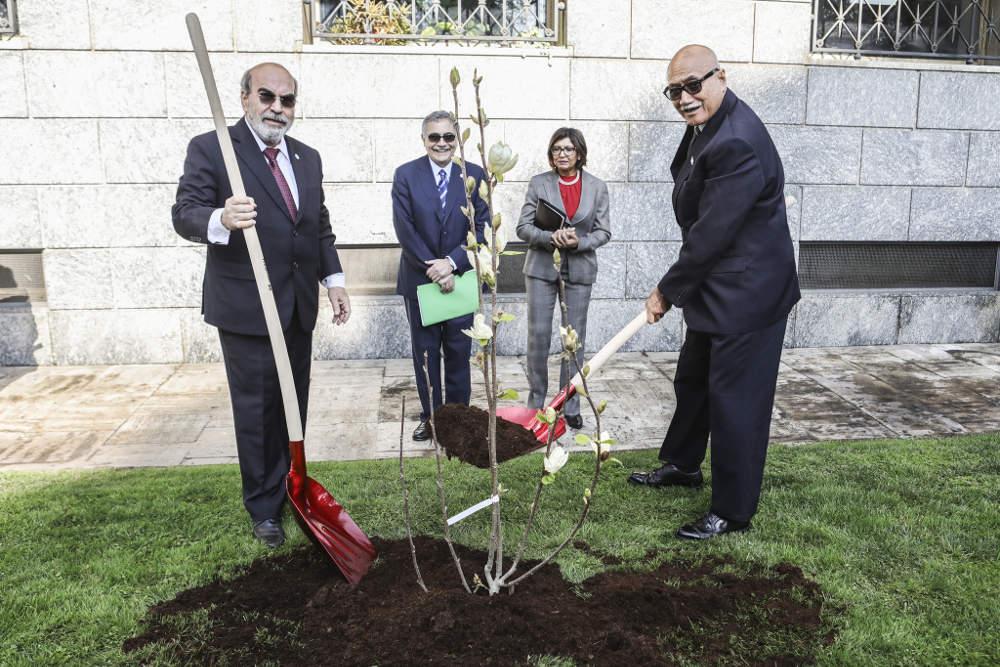21 March 2017, Rome Italy - FAO Director-General Jose' Graziano da Silva meeting with His Excellency Jioji Konousi Konrote, President of the Republic of Fiji. Global Symposium on Soil Organic Carbon (GSOC17) Co-organized by FAO, GSP/ITPS, IPCC, UNCCD/SPI and WMO. Photo credit must be given: ©FAO/Cristiano Minichiello. Editorial use only. Copyright ©FAO.
The maintenance of soil organic carbon stock is vital for climate change mitigation and improvement of soil health and fertility in Small Island Developing States, some of the most vulnerable countries in world.
Pacific Community (SPC) soil expert, Dr Siosiua Halavatau said: “Many management practices that increase soil organic carbon (SOC) also improve crop and pasture yields. If more carbon is stored in the soil as organic carbon, it will also reduce the amount present in the atmosphere, and help reduce global warming.”
Dr Halavatau made these comments in his presentation on Status of Soil Organic Carbon Stocks in the Small Island Developing States (SIDS) at the Food and Agriculture Organisation of the United Nations (FAO) Global Symposium on Soil Organic Carbon (GSOC17) currently underway at the organisation’s headquarters in Rome, Italy.
Soils host the largest carbon terrestrial carbon pool and play a critical role in regulating the global carbon balance.
However, soils have become one of the vulnerable resources in the world due to climate change, land degradation and biodiversity loss.
A 2015 report by FAO and the Intergovernmental Technical Panel on Soils on the Status of the World’s Soil Resources highlighted that while more carbon resides in soil than in the atmosphere and all plant life combined, around 33 percent of the world’s soils are degraded which has led to large losses of SOC.
Dr Halavatau explained that soils from different global agroecosystems, like croplands, grazing lands, rangelands among others, have lost 25 to 75 percent of their original SOC pool, depending on climate, soil type, and historic management. This amounts to about 70 billion tonnes.
Dr Halavatau explained further that these losses also provide an opportunity to replenish carbon reserves of the world’s agricultural and degraded soils of around 21 to 51 billion tonnes of carbon.
“The reversal of soil degradation through the build-up of Soil Organic Matter (SOM) and the sustainable management of land and soils offers large potential to improve the performance of agriculture and forestry in climate change adaptation and mitigation as reported in the climate change assessments and in national greenhouse gas inventories,” he continued.
“In most SIDS long term cultivation, like crop rotation and mono-cropping, reduces SOC stocks in the top soil compared to uncultivated virgin soils. Increased subsoil organic carbon indicates a redistribution of SOC due to soil mixing during land preparation, and organic matter movement during cropping and decay of crop roots. These changes indicate that careful management of top soils is essential for maintaining soil fertility and hence crop productivity on the soils of SIDS,” Dr Halavatau said.
“Research results in the Pacific Islands have shown that we can increase SOC stock by adding large amounts of organic waste including crop residues like sugarcane stubbles, applying thick mulches, minimum tillage, and incorporating leguminous green manure crops like Mucuna within the cropping cycle.
“SPC Land Resources Division is currently supporting Pacific Island countries and territories in addressing soil health issues in the areas of developing appropriate soil management technologies such as use of cover crops, mulches and composts and evaluating root crops and nutritious crops best suited to changing environments in the countries,” Dr Halavatau said.
Discussions at the three-day meeting encompasses three main themes – measuring, mapping, monitoring and reporting Soil Organic Carbon (SOC); maintaining and increasing SOC stocks for climate change mitigation and adaptation, and land degradation neutrality; and managing SOC in soils.
Dr Halavatau joins the President of Fiji, His Excellency Major General (Ret’d) Jioji Konusi Konrote who was also invited to officiate at the opening of the symposium.
Close to 500 participants globally are attending the symposium ending 23 March.
Media contact:
Lauren Robinson, SPC Media Relations, [email protected] or +679 337 0733
About Us:
SPC is the principal scientific and technical organisation in the Pacific region, supporting sustainable development since 1947. It is an intergovernmental development organisation owned and governed by its 26 country and territory members.
